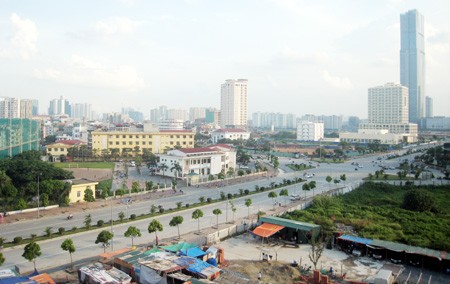(VOVworld)- The National Assembly deputies on Monday discussed revisions of the Land Law. They emphasized on land reserves for agricultural development purposes, the delegation of power in land planning and the reduction of land related complaints and denunciation.
After nearly 10 years taking effect, the 2003 Land Law has brought in positive results. However, there have been problems due to changing land policies and inappropriate and insynchronous contents of the current law. Land resources have not been fully tapped to serve socio economic development. The use of land is reportedly wasteful in many areas. Corruption and wrongdoings in this regard remains a big problem while related complaints and denunciations are more complicated. Besides solving these problems, the revised Land Law prioritises reserving land for agriculture to ensure food security and forest coverage. Uong Chu Luu, a deputy from Thanh Hoa province says: "Under the revised law, 3.8 million ha of land will be reserved for the cultivation of 2 crops of rice a year to ensure food security. The law needs to clearly stipulate the planning of land and the change of land use purposes and revised the duration of land use. Under the current law, a duration of 20 years is applied for rice cultivation land and 50 years for perennial plant land. But under the revised law, a duration of 50 years is applied for both types of land. This regulation will help assure people who invest in agriculture".
 |
Under the revised Land Law, central, provincial and district authorities are involved in land and land use planning. The government will work out a framework of land prices, based on which provincial and municipal authorities are assigned to work out specific land prices. Trinh The Khiet, a deputy from Hanoi says: "It’s good when the government assigned provincial authorities to set land prices otherwise the provincial authorities have to wait for 2 to 3 years to have the prices adjusted".
The mechanism for land acquisition is one of the new contents added in the revised law. According to the law, land is owned by people, the state is a representative owner and the state has the right to reclaim land for security and national defence purposes and for national and public interests. However, National Assembly deputies suggested the revised land law include regulations on settling disputes arising in land reclamation. The revised land law stipulates necessary deposit made by project investors. Tran Thanh Man, a deputy of Can Tho city says: "I agree with article 63 of the law, which stipulates deposits to implement investment projects. Previously, enterprises received land for investment without deposit. But they did nothing and it was difficult for local authorities to ensure that the land is used effectively. With investors making deposit, local authorities can manage the land used by investors and implement other local socio economic plans.
The revised Land Law consists of 14 chapters and 190 articles, up by 6 chapters and 44 articles compared with the 2003 Land Law. These revisions aim to overcome shortcomings and limitations of the current law. Minister of Natural Resources and Environment Nguyen Minh Quang said the revised Land Law aimed at effectively utilizing land, harmonizing interests of the state, people and enterprises and reducing land related denunciation and corruption. The revised Land Law will be further adjusted before submitting to the National Assembly for approval.